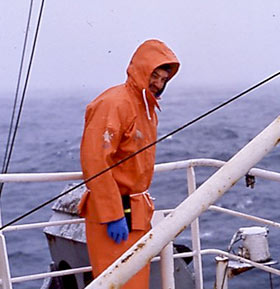Breadcrumb
Michael G. Scott Award Recipients
The Michael G. Scott Award is given annually to the outstanding graduating senior in the Department of Fisheries Biology at Cal Poly Humboldt. The outstanding senior is selected on the basis of Humboldt GPA and on contributions made to the fisheries profession. The award carries with it a financial gift ($1000), the student name and award recognition are announced during graduation ceremonies, and the student's name is added to a brass plaque that hangs prominently on the second floor of the Fisheries and Wildlife Building.
Some words about Michael Scott as told by his father, Cuthbert Scott:
“Michael was enamored with wild and all living things beginning as a toddler. His greatest interests as he grew up had to do with wildlife. As he grew older these interests focused on fishing. He served 2 or 3 years in Vietnam in support of combat units. After Humboldt, he was one of the helicopter borne firefighters (smokejumpers) and ended up with the U.S. Forest Service as a ranger and fish biologist in Alaska. He spent a lot (probably most) of time in the field and most of his projects had to do with improvement of fish habitat in the Misty Fjords and Tongass NF areas. And, as for many other Humboldt Fisheries Biology students, he loved to fish!”


Carrie Cook-Tabor
Received: 1990
I am currently a Fisheries Biologist for the U.S. Fish and Wildlife Service and work in the Western Washington Office located in Olympia , Washington . I received my B.S. in Fisheries Management from Cal Poly Humboldt in 1990 and a M.S. in Fisheries Science from the University of Washington (1994). I've been employed by the U.S. Fish and Wildlife Service's Region 1 for the past 14 years where I began my career as a field technician in the Arcata, California field office, followed by a summer focused on fish health issues in Olympia , Washington . At the University of Washington , where I was a Co-op Education student, I studied the effects of reduced oxygen on trout embryonic development.
In my current position, which I have had for the past 10 years, I have focused on salmon harvest management issues. I have contributed to the development of a method to estimate mortalities of coho salmon in proposed selective and non-selective fisheries, providing a means of evaluating the impacts of interjurisdictional and local selective fisheries on depressed coho salmon stocks in the Pacific Northwest . I am currently working with State, Tribal and Canadian biologists and statisticians in a coast-wide coho salmon cohort-reconstruction effort which will be used to update the pre-season fishery harvest model currently used in fishery negotiations and assessments in the region.


George Watters
Received: 1989
When I was an undergraduate, Dr. David Hankin advised me that I could open many professional doors by developing my quantitative skills; I followed his advice and have been fortunate to have many interesting opportunities since graduating from Humboldt. Importantly, having quantitative skills has broadened, not limited, my field and travel experience. After leaving Humboldt, I attended the both the University of Washington, where I received an M.S. in Fisheries, and the University of California's Scripps Institution of Oceanography, where I received a Ph.D. in Biological Oceanography. As a graduate student, I mostly took classes with quantitative emphases ( e.g. , population dynamics and mathematical statistics), but to complete my research I traveled extensively. I interviewed recreational anglers in Washington 's San Juan Islands ; I measured and tagged crabs onboard a commercial fishing vessel working in Antarctic waters; and I participated in scientific meetings in Australia and Europe . All these experiences were precipitated from my quantitative skills; I worked in the field to collect data for various models I was developing, and I participated in meetings to provide quantitative, scientific advice to Antarctic fishery managers. While working on my Ph.D., I was a full time Fishery Biologist for the National Marine Fisheries Service.
After receiving my Ph.D., my work opportunities expanded further. First, I worked as a Senior Scientist for the Inter-American Tropical Tuna Commission. With the IATTC, I was responsible for assessing tuna stocks (e.g., using models to estimate their abundance) in the eastern tropical Pacific, and I participated in scientific meetings around the Pacific Rim and in Europe . I also traveled throughout Central and South America to observe how data (e.g., length frequencies and species compositions) are collected from commercial tuna fishing vessels. Most recently, I have, again, been working for the National Marine Fisheries Service. I currently supervise a small team of researchers that is studying how conditions in the ocean influence the production of California 's Chinook and coho salmon stocks. Our team builds mathematical and statistical models that require data collected from tagging studies, and we actively work with commercial salmon trawlers to tag fish off the coast of California . Although most of my current research effort is focused on salmon, I continue to collaborate on problems that relate to the management of Antarctic marine living resources and highly migratory species like tunas.


Susan Kingsbury
Received: 1988
1988 - Susan Kingsbury





